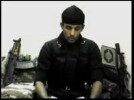- Kant, Hegel and Deleuze on War
- In my own view, war is the result of philosophies that attempt to impose a rational, uniform order on the world. I agree with Hegel痴 assessment that the state will always create an enemy. However, I think that Gilles Deleuze and Felix Guattari draw attention to a way to exist outside of the state. I think that this "nomadic thought" exists in opposition to colonization and that what is remarkable about nomadic thought is that it is able to devise new tactics of resisting the State. [more]
- Al-Qa段da on al-Qa段da
 Al-Qa段da is neither irrational nor unable to intelligently articulate their objectives. The American government is able to disseminate propaganda globally while suppressing al-Qa段da痴 response. Thus, the English speaking world is forced to trust the analysis of al-Qa段da provided by those who have shown themselves willing to lie in their pursuit of an unjust war. If the American public had been able to read al-Qa'ida documents they would have known that al-Qa段da was explicit about their joy in America痴 overthrow of Saddam Husayn. [more] Al-Qa段da is neither irrational nor unable to intelligently articulate their objectives. The American government is able to disseminate propaganda globally while suppressing al-Qa段da痴 response. Thus, the English speaking world is forced to trust the analysis of al-Qa段da provided by those who have shown themselves willing to lie in their pursuit of an unjust war. If the American public had been able to read al-Qa'ida documents they would have known that al-Qa段da was explicit about their joy in America痴 overthrow of Saddam Husayn. [more]
- Film: Its Eyes
 The first film to be released by Why War? treats surveillance cameras as a biological organism slowly taking control of our urban space. Filmed on location in Chelsea and Harlem, we capture the diversity of surveillance cameras in New York City. [more] The first film to be released by Why War? treats surveillance cameras as a biological organism slowly taking control of our urban space. Filmed on location in Chelsea and Harlem, we capture the diversity of surveillance cameras in New York City. [more]
- Arriving: Writing an Ethnography of Resistance
- The role of the ethnographer should be to document how difference can be bridged through solidarity. An ethnography of resistance would convey how solidarity is cultivated in various situations. Having described their arrival and evaluated their success in integrating into the community the ethnographer will have conveyed what is most important: how to join a struggle in progress. [more]
|
(Interactivist Info Exchange, Jul 26)
"Horizontalism is not an ideology, however, it is a relationship — a way of relating to one another in a directly democratic way while at the same time creating through the process of discovery. What has resulted is the creation of an amazing complex of movements, all linked." [more]
Why War? works to activate a broad, global movement for peace and justice based on the principles of nonviolence. To this end, our work is focused on delivering vital news, analysis and strategy to those searching for an answer to the most pressing issue of today: Why War?
https://why-war.com/news/all.php
|